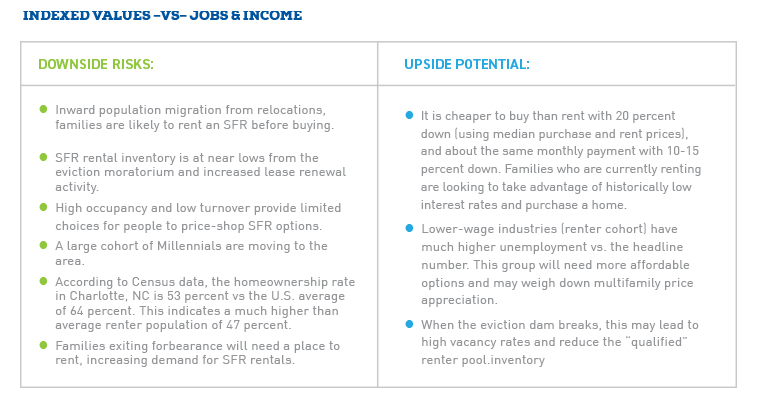The Charlotte-Concord-Gastonia, NC-SC market is the 22nd largest metro in the U.S., the 2nd largest metro area in the Southeast, and second largest banking headquarters in the U.S. after NYC.
Charlotte is one of the fastest-growing cities in the U.S. and has one of the fastest-growing Millennial populations. Many great universities around the metro provide a large talent pool for businesses to recruit local talent.
Our research shows the Charlotte real estate market will remain very competitive in 2021, with strong demand and limited supply boosting home prices higher.

Home Price Metrics
Home prices in Charlotte have been booming from late spring through the end of 2020. As of January 2021, median single-family home prices rose to $290,000, or a significant 11 percent year-over-year increase.
Single-family rental owners in Charlotte have realized a five-year increase of nearly 45 percent, and timely buyers who purchased homes in 2012 realized a 9-year price appreciation of over 70 percent.
Currently, the housing market is very tight, with record low inventory near only one month of supply. The low supply is leading to bidding wars and frequent sales above list price, making it tough for investors to find deals. Low mortgage interest rates, high demand, and a shortage of homes will continue to propel home prices higher through 2021.
Charlotte MSA Home Price Forecast through 2021: +7 percent to +9 percent
There are many positive signs for the Charlotte market for 2021 and beyond, with multiple factors driving the market momentum. Our analysis points to a rapid increase in prices through the summer, and a flattening period into the end of the year when forbearance protections begin to expire.
SFR Price Upside Factors:
- Low mortgage interest rates will continue to drive high demand for homeownership and investing.
- New listing inventory is near all-time lows reached in December, and total active inventory has dropped by nearly 50 percent vs. January 2020. In December, MOI was down to its lowest level in history with only a 30-day supply given the current sales velocity.
- Business relocations and job availability will continue to drive population growth in the area.
- The deadline to apply for forbearance is June 30, 2021 – and those in forbearance can get up to 18 months of reprieve. Eviction moratoriums and forbearance extensions have put the distressed property market on pause, further limiting inventory through the summer.
- “Distressed” sellers exiting forbearance programs have many foreclosure avoidance options. They may be able to sell at market-rate prices, avoiding the foreclosure-driven negative appreciation spiral seen back in 2008.

Rental Rates
As of February 2021, the average three-bedroom, single-family rental home in the Charlotte MSA is $1,470/mo, an increase of five percent from last year. Raleigh MSA rentals in the same class are $115 higher at $1,585 giving an edge to Charlotte for rental housing affordability.
Real estate investors in the Charlotte market have had 5-year SFR rent price appreciation of 34 percent overall, with an average increase of 6.8 percent per year.
Even though rental prices have risen 14 percent faster than incomes over five years, overall affordability for tenants remains healthy compared to other metros. Charlotte’s rent-to-income ratio for 3bd SFR homes is 26.5 percent, which is well below the national average of 31.2 percent for metro MSAs.
The gross rental yield average for 3bd single-family properties is a moderate 8.5 percent for the metro, with most zip codes in Mecklenburg county have a GRY between 7.5-8.5 percent.
Charlotte ranks 26th in the U.S. for five-year SFR rental price increases at 33.6 percent. In comparison, Raleigh’s rents have increased only 23 percent in the same five-year span.
Charlotte MSA Rent Price Forecast through 2021: +4 percent to +6 percent

The Bottom Line
Charlotte has been, and will continue to be, one of the best markets for real estate investors.
Consistent population growth and thriving high-tech and professional services industries will help to buoy the real estate market.
Compared to other major metros, Charlotte is still relatively affordable for renters and buyers alike. These are good signals of a healthy market, and the area provides many opportunities for successful long-term investments. Charlotte should continue to attract new businesses and residents, helping the local economy continue to expand.
Real estate investors looking for a large market with great economic fundamentals should seriously consider the Charlotte market. The economic and population growth momentum is one of the best in the country, and the local real estate market will benefit from these trends.






















0 Comments